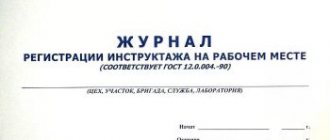Capacity
One of the main conditions for getting a job is the full legal capacity of a citizen, but sometimes you can find a job with partial legal capacity.
Note that a citizen receives partial legal capacity at the age of 14 , from the moment he receives a passport, and full legal capacity at the age of 16 .
But there are employers who specify a minimum age for employment - no younger than 18 years ; such restrictions are usually established when entering the public service, military service, or hazardous work.
The main job responsibilities of the employee
An employee’s labor responsibilities are spelled out in Article 21 of the Labor Code and are aimed at the conscientious performance by the worker of his professional functions, as well as at careful handling of the property of the enterprise and internal labor regulations.
The employee's responsibilities include:
- careful performance of labor functions specified in the employment contract;
- following the local labor regulations of the enterprise;
- maintaining worker discipline;
- implementation of the stipulated labor standards;
- compliance with safety and labor protection requirements;
- careful handling of the property of the employer and his colleagues;
- immediate notification of management about the occurrence of a situation that threatens the life or health of people or the property of the enterprise.
The specific powers and responsibilities of an employee corresponding to the position he occupies are spelled out in detail in the job description, which is an internal document of the enterprise, developed for each position separately and approved by the manager. The employee must be familiar with his job description. The date of familiarization with the instructions is recorded in the internal documents of the organization and is certified by the personal signature of the employee.
Rights
Article 21 of the Labor Code of the Russian Federation lists the basic rights and obligations of an employee, starting with what he can and should receive from the employer.
Fundamental rights for workers of all types include:
- drawing up, amending and terminating an employment contract ;
- provision of a workplace for carrying out work activities;
- timely payment for labor corresponding to the complexity of the work performed;
- vacation lasting from 28 calendar days once a year (after what period of work an employee has the right to go on paid vacation, we described here);
- providing off every week;
- training in the field corresponding to the position held and training for advanced training.
In addition, Art. 219 Labor Code establishes the rights of an employee:
- to defend by legal means interests in the field of labor obligations;
- participation in trade unions ;
- to receive compulsory monetary compensation in case of accidents at work, when carrying out professional activities in hazardous production conditions, and others.
The need for a job description
Russian legislation does not stipulate the need for job descriptions in every company. An employer with any organizational form has the right to accept such a document, but is not obliged to do so. It is considered to be a handy tool that can be used for the following purposes:
- Clear regulation of obligations between the parties; already at the interview stage, the candidate can familiarize himself with the list of tasks assigned to him.
- Detailing the activities of employees, as well as establishing the boundaries of authority.
- A general guideline for resolving disputes between superiors and subordinates.
- Assessment of personnel by third-party structures for professional compliance.
In general, the entire list of responsibilities can be fixed in the contract. But a well-written job description is a way to unify the work system at the enterprise. Typically, the document includes the following sections:
- responsibilities - direct tasks that are assigned to an employee in a specific position; education in most cases does not play a role;
- rights – a list of the employee’s powers (there is no need to rewrite the general rights of employees);
- responsibility is not always a used section, but some managers include information about possible sanctions for failure to complete tasks;
- interaction - a description of the principles and rules of communication between an employee and his superiors, subordinates, other departments, and so on.
In most cases, the job description is included in the agreement as an annex, but an integral part. A reference must be made in the document. It is believed that as soon as the specialist has signed the contract, he has agreed to the addition.
Duties and Responsibilities
The employee is endowed with the provisions established in Art. 21 TC obligations:
- do not violate the rules of conduct;
- observe the time of departure and arrival at the workplace, as well as the lunch break time established by the organization;
- conscientiously fulfill their obligations in accordance with official regulations;
- comply with established labor standards ;
- treat things provided by the employer, as well as the things of other employees, carefully;
- comply with the rules ensuring the safety of labor and property;
- report all “emergency” situations that pose a threat to the safety and health of other employees, as well as property, to the direct supervisor .
Also, Article 214 of the Labor Code establishes the responsibilities:
- adhere to labor protection obligations;
- use self-defense equipment correctly;
- undergo appropriate training and medical examination as directed by the employer.
In addition to rights and obligations, the employment contract contains clauses on the financial responsibility of the employee, the content of which is fixed in Chapter 9 of the Labor Code of the Russian Federation.
Labor law establishes both individual and collective financial responsibility.
The law (Chapter 39 of the Labor Code of the Russian Federation) distinguishes between full and limited financial liability. Most often, limited financial liability is found, when the cost of the company’s property on the balance sheet is charged from the employee’s salary within the limits of the salary calculated on the average for the month .
It is important to understand that over time the book value of the property should decrease with the calculation of the period of use of the property!
Another type of liability occurs if the following conditions are met: the employee has reached the age of majority , holds the appropriate position and has a written contract or additional agreement that specifies the conditions of liability and the act of transfer of property (individually in each case).
An example of a written agreement on full financial liability.
Sample additional agreement on liability.
Full financial liability occurs if an agreement on full financial liability is signed by all parties.
Unfortunately, the growth of labor rights violations related to illegal dismissal, non-payment of money to employees, non-payment of overtime, reduction of legal days off, etc. is
At the same time, not all disputes in court are resolved in favor of the employee , since the employer in such cases tries to protect itself by carefully considering all the clauses of the employment contract, which the employee does not always read carefully.
In cases of violation of the law by the employer, only the employee suffers, since hiring a good lawyer to resolve the dispute in most cases is impractical .
Parties of labor relations
Labor relations are a system of relationships that arise between a hired specialist and the employing company. In order to streamline joint activities and define the rules of interaction, the parties enter into an employment contract, which spells out all the significant conditions for future cooperation.
In Art. 20 of the Labor Code of the Russian Federation distinguishes two sides of labor relations:
| Worker | Employer |
| An individual who provides the employing company with a predetermined list of services under an employment contract. In general, citizens over 16 years of age are allowed to work. | A legal or natural person authorized to enter into employment contracts with hired specialists |
It is clear that the rights of an employee are exercised by him personally or through associations of enterprise employees - trade union organizations. Employing firms organize interaction with personnel through their management bodies or other authorized persons, individual entrepreneurs - independently.
According to Art. 20 of the Labor Code of the Russian Federation the following may act as employers:
- individual entrepreneurs who have passed state registration;
- citizens running a business without forming a legal entity (notaries, lawyers);
- individuals who hire employees for personal needs (for example, to provide assistance with housekeeping);
- organizations formed in accordance with the legislation of the Russian Federation.
Individuals who have reached the age of 18, are fully capable and have a source of income from which the due remuneration will be paid have the right to hire employees for personal needs.
Guarantees and obligations
According to the Labor Code of the Russian Federation, an employee has the right to a workplace provided by the employer . He, therefore, sets his own working conditions.
And the only protector of employee rights is the Labor Code, where in Art. 220 TK, and in Art. 9 of the Law on Labor Protection establishes its guarantees , which are aimed at ensuring the safety of the workplace , fixing the minimum wage , the obligation on the part of the employer to establish conditions that are safe for life and labor protection, and provide for cases of employee refusal to fulfill his obligations if a threat arises to his life and health.
Based on these provisions of the law, the employer’s labor obligations include ensuring the above conditions , and in addition, observing restrictions for certain types of employees, transferring the employee in the event of a deterioration in his health according to a medical report, setting a rest break and taking other measures.
By reading special publications from our experts, you can also learn:
- What is the responsibility of the parties for violation of labor protection requirements?
- Can I be fined at work and forced to go on leave?
- What rights does an employee have when dismissed for various reasons?
- When can you refuse a job and quit without working?
- How can an employee protect his rights?
Labor function in the organization and patterns of its change
The functional states of workers in the production system are influenced by many factors:
- Positive dynamics of the organization’s development with the chosen growth strategy or limited growth. This usually entails the emergence of new positions, expansion of the scope of activities within the framework of previous job responsibilities, or, conversely, a narrowing of their responsibilities and powers.
- Increasing complexity of the organization's structure. Despite the fact that this factor indicates growth dynamics, for employees of the base structure this may mean delegating a number of functions to subsidiaries, territorial or industry structures. This situation is fraught with reductions and relocations, although in the future it may be necessary to increase the staff of the parent organization.
- Most often, in this situation, personnel are reduced, moved, and job responsibilities are expanded. As part of the reduction strategy, it is also possible to increase personnel with an increase in the number of positions. This can happen if this strategy is chosen for the purpose of regrouping forces, and not for further liquidation.
Only three standard situations are indicated here, but in life not everything develops according to the standard. Each organization in its development goes through many intermediate stages and different options.
The main responsibilities of the employer
The employer has slightly more responsibilities than the employee. This is explained by the need to fulfill the guarantees to ensure decent working conditions provided by law.
The responsibilities of the employer include:
- Compliance with Russian labor legislation.
- Providing employees with the work specified in the employment contract.
- Compliance with safety and legally guaranteed working conditions.
- Supplying workers with equipment, technical documentation, tools and other means necessary to perform their job duties.
- Employees' remuneration is equivalent to their labor contribution and without discrimination.
- Compliance with salary payment deadlines.
- Conducting collective negotiations and concluding collective agreements.
- Providing the collective with all relevant information necessary to conclude a collective agreement.
- Bringing to the attention of the interested part of the team information about the internal documents of the enterprise related to the work activity of a particular employee.
- Compliance with the orders of regulatory government organizations in the field of labor, including timely payment of fines.
- Consideration of messages from the team (trade union) about detected violations of labor legislation and taking measures to eliminate these violations.
- Guaranteeing the participation of employees in the management of the organization in the forms provided by law.
- Providing everyday comfort to employees related to the performance of their job duties.
- Social insurance of employees.
- Compensation for losses to employees in connection with the performance of their job duties, including compensation for moral damage.
The employer's responsibilities listed in Article 22 of the Labor Code are further specified and presented as separate obligations, depending on the situation that requires resolution in a specific article of the code.









